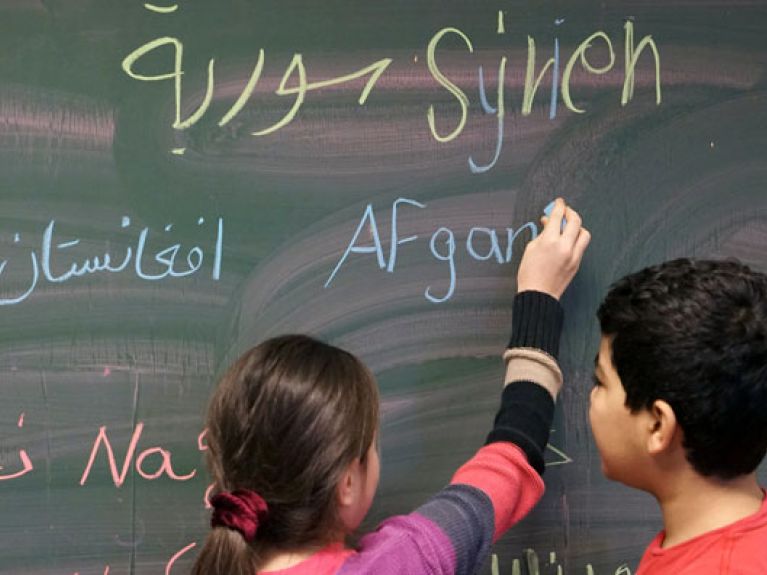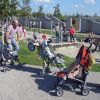Welcome to Berlin
International visitors found out on a tour of the Moabit district how a school and volunteers are busy promoting integration.

The name is well chosen: “Miriam-Makeba-Grundschule” is written on a banner in front of the brick primary school building in Berlin’s Moabit district. The South African singer is sure to have liked it here: Music plays a major role at the primary school – which is also multicultural. Only one in five of the 470 children speak German as their first language. The families of the others come from Turkey, Lebanon and numerous other countries. Recently some 50 refugee children joined the school, who are now taught in four so-called welcome classes. The situation in Moabit is a particular challenge for her and her colleagues, explains headmistress Karin Nithammer-Kachel to her international guests. The journalists and academics are participants of the Federal Republic of Germany’s Visitors Programme. The Federal Foreign Office has invited them to explore the topics of immigration and integration in Germany for one week.
The Miriam-Makeba-Grundschule seeks to make certain all the children get a good start in their educational lives. Karin Nithammer-Kachel talks about language teaching, a football academy and training pupils as mediators. What is crucial however, says the headmistress, is teaching in small groups: “That is the only way we can support the pupils in accordance with their individual needs.” Anrás Földes, a journalist from Hungary, wishes to know whether the children from immigrant families can’t speak a word of German when they first come to school. “Often they can’t speak either German or their native language very well,” says Nithammer-Kachel. Despite that, in the end 20 to 30 percent of the children manage to reach the level of education required to attend the higher level of secondary school, the “Gymnasium”, where they can do their “Abitur”, similar to A Levels and the highest school-leaving qualification in Germany. That is fewer than the average, but for the Miriam-Makeba-Schule it is a success.
Yet challenges remain. Craig Damian Smith from Canada asks whether the school’s social worker is trained to deal with traumatized refugee children. The political scientist teaches and conducts research on international migration at the University of Toronto. He also heads the “Together Project”, which promotes personal interaction between refugees and the Canadian population. Karin Nithammer-Kachel answers with a “no”, an answer she then has to repeat in response to the question whether it is easy to involve the parents of immigrant children in daily school life.
“Kiezmütter” support immigrant families
Involving the families – this is where the “Kiezmütter”, or “neighbourhood mothers”, come in: local women, most of whom themselves have a migratory background. The centre of the initiative is the next destination of the international visitors on their tour through Moabit. The bright, open building is situated next to a playground and sports field and has a small garden. Some 20 women receive the guests. They come from the Arab world, Turkey, Bulgaria and Russia. As “neighbourhood mothers” they support families that don’t know who to turn to with questions, or who are reluctant to accept help. They visit the families in their home and inform them about education and healthcare offerings and accompany them to appointments at the municipal authorities or to register for a kindergarten. They are specially trained for this work.
“We qualify the women in order to help the families, but this time also benefits the women themselves,” says coordinator Shiva Saber Fattahy, who comes from Iran. “They find their path, might then do vocational training and find a profession.” The initiative has already trained more than 50 women as neighbourhood mothers and has won several integration awards for its work. “We need examples like this,” said the former Federal President Joachim Gauck in praise of the initiative during a visit, and the international visitors also evidently like the concept.
Emergency support for refugees
Talking to Christiane Beckmann from the “Moabit hilft” (Moabit helps) association, the participants also find out that same day how important the commitment of civil society is. Founded in 2013 to help local people in need, since summer 2015 the association has focussed on working with refugees. It was the difficult situation in front of the Regional Office for Health and Social Affairs Berlin (LAGeSo), located in the Moabit district, that prompted the association to act. Refugees sometimes had to wait at the office for very long periods, because it was initially overstretched by the high numbers of applicants. Beckmann and her fellow campaigners took to Facebook to ask for donations in kind, organized a meal service, medical care and accommodation for those arriving in the evening or at the weekend. “We were busy 16 to 18 hours a day,” says Beckmann.
“And today – are you still doing this work?” the visitors wish to know. “Of course!” Although only about 25 refugees a day arrive at the LAGeSo now, in summer 2015 it was up to 1,000. Yet even those who have been living in Germany for a while can still use some help. The approximately 40 permanent members of “Moabit hilft” (many of them themselves came to Germany as refugees) organize language courses, help with filling out forms and prepare refugees for their interview concerning the asylum procedure. Christiane Beckmann has now given up her job and is a permanent employee of the association. She wants to help make everyone feel welcome in her hometown Berlin.

